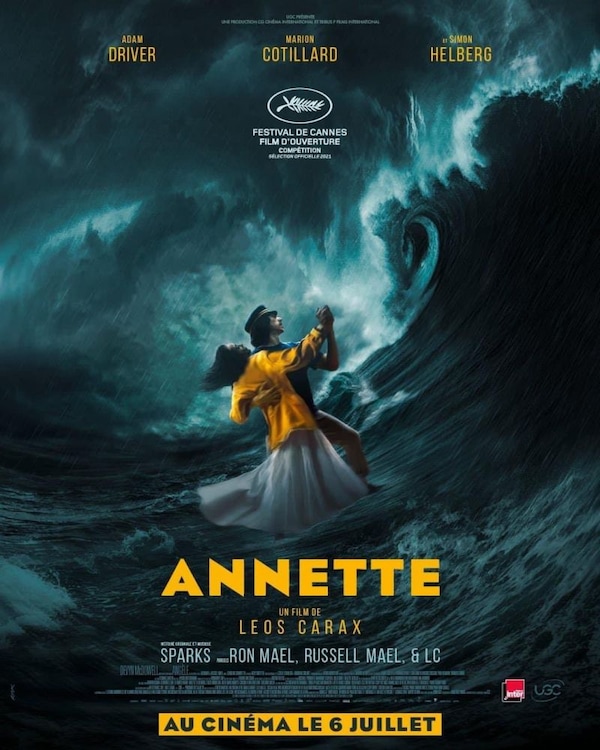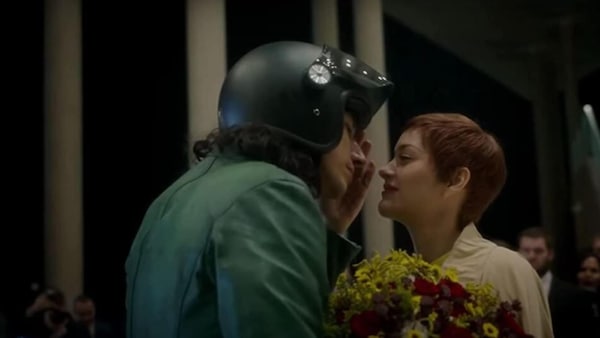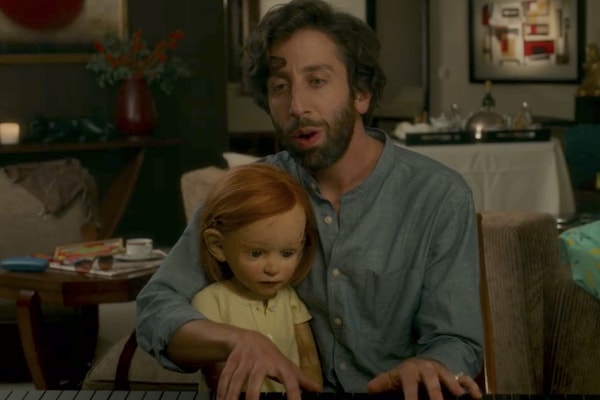Annette movie review: The Adam Driver-Marion Cotillard starrer gives hope for fun watch but is a musical disaster
It is interesting to note that Simon Helberg of The Big Bang Theory fame does not have any name for his character, even though he plays a pivotal role. He is addressed to as the accompanist initially, as he worked for Ann and later, conductor friend by Henry. It moves along the story so well that you hardly notice it until almost the end of the film

Annette
Last Updated: 04.29 PM, Nov 26, 2021
Story:
Directed by Leos Carax, the story is by Ron Mael and Russell Mael. The film stars Adam Driver, Marion Cotillard, Simon Helberg, among others. The musical chronicles the life of a couple Henry (Adam Driver) and Ann (Marion Cotillard) whose life turns upside down once they have their first baby Annette, a mysterious little girl with gifted talent. Henry is a stand-up comedian who has a fierce sense of humour and develops professional jealousy when his wife, an opera singer, becomes more successful than him. It takes a turmoil on their relationship and in a fit of rage, Henry kills his wife who returns to haunt him.
Review:
The film Annette offers a promising start. It gives you hope that it will be a fun watch as a voice-over calls out for ladies and gentlemen and says, "We need all your attention. And if you want to clap, laugh, fart, boo, do it in your head." The narration especially amps up your expectation only to disappoint you later. The story begins with a recording in a music studio where a singer starts singing, 'May We Start' as the orchestra plays along. The singer then is joined by the rest of the cast. The song grows on you slowly as you experience it. The way it is created in a single shot is interesting.
The story then introduces Henry (Adam Driver) as a stand-up comedian. He does crack up a few dark jokes as he presents himself on stage in a robe, accompanied by background artists in nightgowns, all in green. He is then seen confirming the rumours about his engagement with Ann (Marion Cotillard), an opera singer, who seems to be dying of some illness. They get married and have their first child. Their happily-ever-after comes to an end after they have their baby. It then talks about climate change and 'Me too' movement and postpartum depression. Though postpartum depression faced by Ann and also the child's father Henry are understandable, it is very confusing why the makers decided to also include the Me Too movement and the paparazzi asking, rather singing, the six women who decided to speak up, why now. It gets you to wonder if Henry, who only appeared so far as a loving husband, is abusive. It is not clearly evident later if Ann was abused by him but his character develops into someone who loses control in a fit of rage.
The scene of Henry and Ann's vacation on a ship along with their baby was too dramatic. Drunk Henry pushes Ann into the water on a stormy night and then rows away in a lifeboat with his baby Annette. While they call it a night on an island under the moon-lit sky, the ghost of Ann appear and she sings to Henry that she will haunt him for the rest of his life.

I understand that the film is a musical but that doesn't necessarily mean that each and every line have to be sung. Simon sings 'It's freezing' as he is drowned in the pool by Henry, which appears funny. Simon does have a few simple dialogues but it looks like Adam Driver prefers to sing rather than talk. He also sings 'I love you' as he has sex with his wife, which looks disgusting. He barely has any dialogues that he normally delivers except a few lines in his stand-up act in the film. However, his weird and fierce sense of comedy brings out the hypocrisy of people. His audience bashes him when he starts talking about his wife and how he has fallen out of love with her. He says love makes him sick and lies (though initially) that he has killed her. His audience asks him to leave the stage and he asks if that is all that they cared about him. His question does get you thinking about how people do not really care until and unless their demands are met.
Annette turns out to be a miraculous child who starts singing even before she could talk. She is then exploited by her father to earn money, taking her around the world for performances along with the accompanist/conductor friend, played by Simon Helberg. Though the conductor friend does not approve of it initially, he gets convinced, worried about the child's future. The story then brings in a few twists and explores new plotlines, though predictable.
It is interesting to note that Simon Helberg did not have any name for his character, even though he plays a pivotal role. He is addressed to as the accompanist initially, as he worked for Ann and later, conductor friend by Henry. It moves along the story so well that you hardly notice it until almost the end of the film where you wonder what is his name.

The film uses a puppet as the child Annette until the last scene, where the puppet is transformed into a real child, played by Devyn McDowell. As father and daughter sing to each other, the saga suddenly bursts into life. The daughter decides not to forgive her father and says he has nothing to love anymore as she is taken away by the police officer.
The very little dialogue brings relief to otherwise all the singing in the lengthy two-hour film. It comes as a breather but soon transforms back to bad singing. However, the opera performances and the orchestra music, coordinated by Simon's character, were good. The story would have been better suited in the Broadway musical format than the film, if the makers, again agree to cut down on its runtime.
Verdict:
The film would have probably been a good watch had it not been a musical for the social evils it highlights. Singing each and every line gets onto your nerves and becomes intolerable when it drags for over two hours.
WHERE
TO WATCH
Subscribe to our newsletter for top content, delivered fast.

